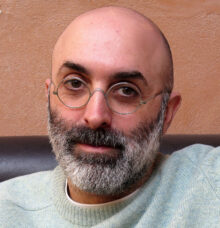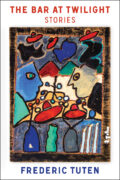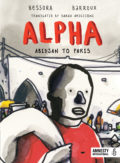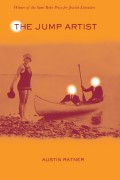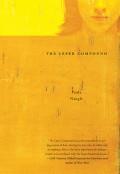“Fantastic . . . Intense pain and beauty are offset by an unabashedly boyish sense of humor; in the same page, Halfon can skillfully switch from a discussion about intense immigrant alienation to a hilarious observation on the short male attention span for pornography.”
NPR Alt.Latino
( link)-
on
“Engrossing . . . The Polish Boxer by Guatemalan novelist Eduardo Halfon, is a semi-autobiographical tale about roots and origins, identity and cultural loss, and the complex relation between the individual, his or her family story, and the heavy burden of History . . . Short but intense.”
NBC Latino
( link)-
on
“The hero of Halfon’s novel delights in today’s risible globalism, but recognizes that what we adopt from elsewhere makes us who we are.”
New York Times Editors’ Choice citation
( link)-
on
“Elegant.”
Marie Claire
-
on
“A professor mentors a student, gains wisdom from a Mark Twain scholar and searches for a Gypsy musician, and that’s only part of the story in this incredible, achingly real yet enigmatic novel.”
San Francisco Chronicle, “Top Shelf” Recommendation from Bay Area independent bookstore Copperfield’s Books
( link)-
on
“This globe-trotting novel digs into mysteries of the past and present.”
San Francisco Chronicle, “Top Shelf” Recommendation from Bay Area independent bookstore Mrs. Dalloway’s
( link)-
on
“Tight and lean . . . falling somewhere between the novels of Roberto Bolaño, WG Sebald, and Junot Díaz.”
Telegraph
-
on
“[The Polish Boxer] exists in the no-man’s-land between fiction and memoir. In the end, we decide, this is fable: only the stories are important.”
Guardian
( link)-
on
“A mix of finely nuanced prose and humor.”
World Literature Today
-
on
“Beautiful and provocative . . . a wonderful read which begs to be re-read.”
Jewish Book World
( link)-
on
“This book provides multiple pleasures: clear, intense prose; sharp, laugh-out-loud depictions of classrooms and conferences . . . and the apparent seamlessness of the translations . . . . The book itself gives a resounding retort to those who might dismiss it as ‘another’ book ‘about’ the Holocaust.”
Jewish Journal
( link)-
on
“Halfon passionately and lyrically illustrates the significance of the journey and the beauty of true mystery. The Polish Boxer is sublime and arresting, and will linger with readers who will be sure to revisit it again and again.”
Booklist (starred review)
( link)-
on
“These are the stories of life . . . the question of survival (of both people and cultures) and the way the fictional makes the real bearable and intelligible.”
Publishers Weekly (boxed review)
( link)-
on
“Highly readable and engaging . . . provides readers food for thought about the nature of literary creations.”
Library Journal
( link)-
on
“Brilliant . . . opens with one of the best classroom scenes I’ve ever read.”
Shelf Awareness for Readers
( link)-
on
“In the simplest explanation, The Polish Boxer is a series of encounters for literature professor Eduardo—with a young poet, university professors at a Mark Twain conference, his grandfather, his charming girlfriend, who draws her orgasms, and Milan Rackic, a Serbian-Gypsy pianist. In the more complex explanation, it is a journey of self-discovery.”
ForeWord Reviews
-
on
“Eduardo Halfon has been deemed one of the best young Latin American writers by the Hay Festival of Bogota; read his first work to be translated into English, The Polish Boxer, and you’ll see why.”
Shelf Unbound
-
on
“A brave and touching and dead stylish examination of the nature of fiction, truth and lies.”
Dazed & Confused
-
on
“Halfon’s curiosity about his grandfather’s experience in a concentration camp burns through every chapter from the most subtle level to deep investigation . . . He has succeeded in warping a modern Balkan mystery into a Holocaust memoir . . . intrinsically blend[ing] fiction with reality in a deeply visceral way.”
Rumpus
-
on
“The Polish Boxer immediately seduced me; on the first page, I felt the spark of recognition that comes from reading something with actual depth and import.”
Full Stop
( link)-
on
“The tales are spellbinding, the prose is magnificent, and several parts will make you laugh out loud.”
Gozamos
( link)-
on
“A revelation . . . The Polish Boxer is a book of small miracles. . . . For sheer narrative momentum and fascination with the mix of life and books, sex and art, there are echoes of the Chilean master Roberto Bolaño.”
Words Without Borders
( link)-
on
“Like a memoir by Anthony Bourdain mixed with tones of Kerouac . . . The Polish Boxer is sexy; it’s moving; it’s a little bit in the gutter, but it’s looking up at the stars.”
Insatiable Booksluts
( link)-
on
“Get yourself to your local bookstore or your library and ask for Eduardo Halfon’s The Polish Boxer. Get comfortable . . . Pour yourself a drink. Put on some music—jazz, gypsy, or whatever inspires your heart to longing. And enjoy this magical, unreal trip through reality.”
Bookconscious
( link)-
on
“Masterful . . . infused with sensitivity, humor, touching moments, magical prose, and illuminating stories.”
Book Diva
( link)-
on
“As much a novel as Jennifer Egan’s A Visit from the Goon Squad . . . easily as good as what’s been published in the fiction section of The New Yorker.”
BookSexy Review
( link)-
on
“I can’t remember the last time a book made me cry . . . ”
North of the 45th Parallel one-minute audio book review on Washington’s KTRT fm
( link)-
on
“Eduardo Halfon is a brilliant storyteller, whose gifts are displayed on every page of this beautiful, daring, and deeply humane book.”
Daniel Alarcón, author of War by Candlelight and Lost City Radio
-
on
“Eduardo Halfon’s prose is as delicate, precise, and ineffable as precocious art—a lighthouse that illuminates everything.”
Francisco Goldman, author of Say Her Name
-
on
,
“The Polish Boxer is the most memorable new novel I have read all year—the voice pitch-perfect, the imagery indelible. What a wonderful writer.”
Norman Lebrecht, author of The Song of Names
-
on
“The Polish Boxer is an enchanting, unclassifiable book of encounters, impressions, and improvisations: a book for the ages, which can be read in one sitting, and then again, and again, and again.”
Christopher Merrill, director of the International Writing Program at the University of Iowa and author of The Tree of the Doves: Ceremony, Expedition, War
-
on
“It is not often that one encounters such a mix of personal engagement and literary passion, or pain and tenderness.”
Andrés Neuman, author of Traveler of the Century
-
on
“Eduardo Halfon belongs to a new generation of Latin-American writers who, from the beginning, demonstrate an impeccable mastery of their craft, without any hesitation in the use of language.”
Sergio Ramírez, former Vice President of Nicaragua and author of Margarita, How Beautiful the Sea
-
on
,
“God, I loved this book from the first page to the last. It is deeply moving, imaginistic, achingly real and yet thoroughly enigmatic. Each experience while sharply told escapes easy meaning and yet sets us up in wonder—how was that so we ask? Halfon cares so much for his story and those who inhabit it that we simply want to squeeze his hand and say thank you, this book is a gift, a marvel.”
Sheryl Cotleur, Copperfield’s Books in Northern California’s Sonoma County
-
on
“Halfon’s book is one that I just keep thinking about and wondering about. It’s not possible to describe it neatly other than to say that it’s shape-shifting and without one genre and written beautifully.”
Hans Weyandt, Micawber’s Books (St. Paul, MN) in an interview with Caroline Leavittville on the titles he finds himself “pressing into everyone’s hands these days”
( link)-
on
“A Guatemalan literature professor named Eduardo Halfon (postmodern coincidence?) searches for his origins throughout the world in this slim, haunting novel. Through stories of a gypsy Serbian pianist, Israeli travelers, and his Jewish grandfather, Eduardo seeks to understand how exile, his own and others’, has shaped his identity, and how people cope with the yearning for a homeland that they’ve never had.”
Shane, WORD (Brooklyn, NY)
( link)-
on
The Polish Boxer covers a vast landscape of human experience while enfolding a search for origins: a grandson tries to make sense of his Polish grandfather’s past and the story behind his numbered tattoo; a Serbian classical pianist longs for his forbidden heritage; a Mayan poet is torn between his studies and filial obligations; a striking young Israeli woman seeks answers in Central America; a university professor yearns for knowledge that he can’t find in books and discovers something unexpected at a Mark Twain conference. Across his encounters with each of them, the narrator—a Guatemalan literature professor and writer named Eduardo Halfon—pursues his most enigmatic subject: himself.
Mapping the geography of identity in a world scarred by a legacy of violence and exile, The Polish Boxer marks the debut of a major new Latin American voice in English.
In consultation with the author, The Polish Boxer was translated from the Spanish by an accomplished international team of five: Ollie Brock, Thomas Bunstead, Lisa Dillman, Daniel Hahn, and Anne McLean.
José María de Pereda Prize for the Short Novel
International Latino Book Award Finalist
New York Times Editors’ Choice
Los Angeles Times “Holiday Gift” selection
Two-time San Francisco Chronicle “Top Shelf” selection
Shelf Unbound “Top 10 Book of the Year” selection
Excerpt from The Polish Boxer
From “White Smoke”
When I met her in a Scottish bar, after I don’t know how many beers and almost an entire pack of unfiltered Camels, she told me that she likes when men bite her nipples, and hard.
It wasn’t a Scottish bar, but rather any old bar in Antigua Guatemala that only serves beer and was called (or was referred to as) The Scottish Bar. I was drinking a Moza at the bar. I prefer dark beer. It makes me think about old-fashioned taverns and sword fights. I lit a cigarette and she asked me in English, sitting on a stool to my right, if I would give her one. I guessed by her accent that she was Israeli. Bevakashá, I said to her, which means you’re welcome in Hebrew, and I held the box of matches out to her. She got friendly right away. She told me something else in Hebrew that I didn’t understand and I clarified for her that I really only remembered three or four words and a random prayer or two and maybe how to count to ten. Fifteen, if I really tried. I live in the capital, I told her in Spanish to show her that I wasn’t an American, and she confessed to me that she was confused because she hadn’t imagined that there were Jewish Guatemalans. I’m not Jewish anymore, I smiled at her, I retired. How are you not, that’s not possible, she yelled in the way that Israelis tend to yell. She turned towards me. She was wearing a thin white cotton Indian style blouse, worn jeans and yellow espadrilles. Her hair was dark brown and she had emerald blue eyes, if emerald blue even exists. She explained to me that she had recently finished her military service, that she was traveling around Central America with her friend and that they had decided to stay in Antigua for a few weeks to take Spanish language classes and make a little money. With her, she pointed to show me. Yael. Her friend, a serious and pale girl with exquisite shoulders, had served me a beer. I greeted her while they spoke in Hebrew, laughing, and I thought I heard them mention the number seven at one point, but I’m not sure why. A German couple came in and her friend went to serve them. She grabbed my hand firmly, told me it was such a pleasure to meet me, that she was named Tamara, and then took another cigarette without asking me.
I ordered another beer and Yael brought us two Mozas and a plate of chips. She stayed there standing in front of us. I asked Tamara her last name. I remember that it was Russian. Halfon is Lebanese, I said, but my mother’s last name, Tenenbaum, is Polish, from Lodz, and both girls shrieked. It turned out that Yael’s last name was also Tenenbaum, and while she verified it on my driver’s license, I started to think about the remote possibility that we were from the same family, and I imagined an entire novel about two Polish siblings that thought that their entire family had been exterminated, but all of a sudden find each other, after sixty years apart, thanks to the grandchildren, a Guatemalan writer and an Israeli hippy, who had met by chance in a Scottish bar that wasn’t even Scottish in Antigua Guatemala. Yael got a liter of cheap beer and filled three glasses. They gave me my license back and we toasted to us, to them, to the Poles. We stayed silent, listening to an old Bob Marley song and contemplating the immense smallness of the planet.







